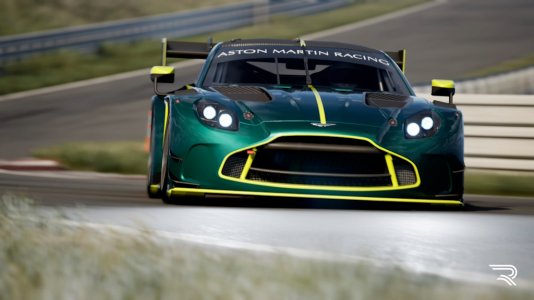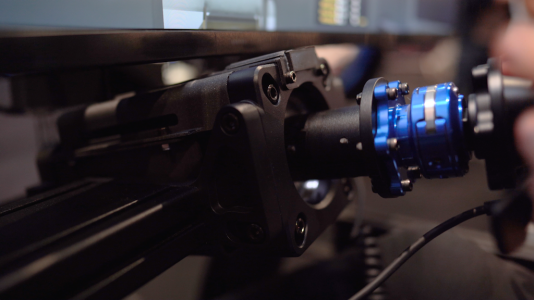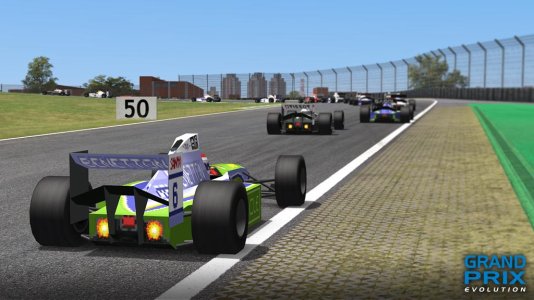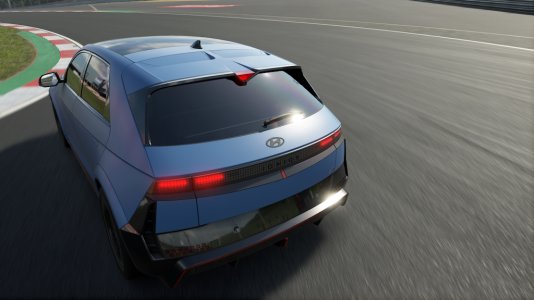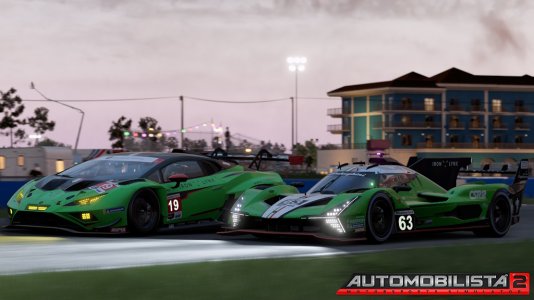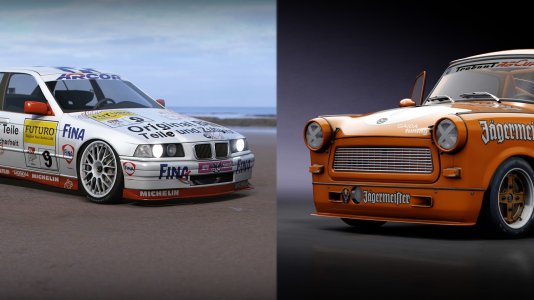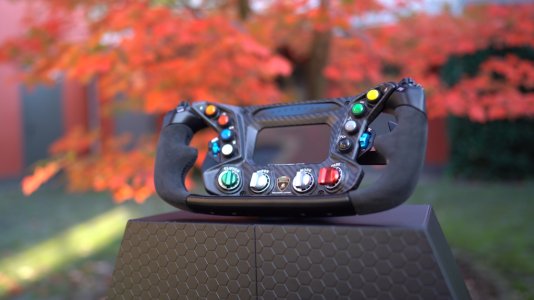Ever wonder what goes into establishing and operating a top level simracing team? Surely it takes a lot of work; surely that work takes a lot of time; and surely time and work are only the starting ingredients to this dish of both despair and pleasure. But where does it all start? And why even start it? Well, thanks to Johannes Kunkel, manager of Precision Motorsports, we at RaceDepartment are able give you a behind the scenes look at a top tier simracing organization. So continue on, good reader, and be enlightened on the path to sim-righteousness!
The Story of Precision Motorsports
To run any competitive simracing team, the first thing a manager needs is motivation. After all, what goals can a team reach when they have no drive, so to speak, to take them anywhere? As for Johannes’ motivations behind starting Precision, the young German had always been fond of managing sim-teams. It goes back to his time on Grand Prix Manager 2, where he would practically bankrupt his teams trying to get them to the top. (For those of you that don’t know, GPM2 was a PC title for windows where players played the role of an F1 manager against AI opponents or up to 4 humans players.)
Later, Johannes began actually playing "driving" sims, and he played every sim he could get his hands on. “I was hooked on racing games,” Johannes puts it. Along the way, he managed to get his first race crew together, a small group of drivers, called Pilot Pen Racing.
His fire for managing simracing teams was only growing. Johannes got involved with Formula Simracing sometime in 2007. However, after the end of the 2007 campaign, his ambition as a manager led him to branch out, along with a few other drivers, and create the organization we now know as Precision Motorsports. “Our aim was always to get into Professional Simracing, but we hadn’t planned on joining the World Championship in our first year…” Johannes says (FSR is a simracing series that is broken down into multiple divisions--the World Championship, or WC, level being their highest division.) Although it wasn’t what the newly founded Precision team was looking to do it, it was exactly what they did, in joining the WC division after having been freshly incepted into FSR that very same year. “When an opportunity to join the WC comes, you just can’t say no to a chance like that,” Johannes told us.
Their first year was rocky, to say the least. The young team finished in dead last in the constructor’s championship. The crew stayed optimistic though, and Johannes told us in our sit down with him that he thought of it as a learning experience. “For the 2009 season, we planned to go big with the team,” he says.
Sadly, 2009 started poorly for Precision as well. Johannes spoke of trying to sign top drivers to the team in the off-season before the 2009 campaign, but the veteran drivers wanted little to do with the upstart Precision. “We couldn’t sign the drivers we wanted,” Johannes explains. “Even though we put good offers [money] on the table, it wasn’t enough to overcome the reputation we had as one of the lesser teams.”
The team was, however, able to sign Jaakko Mikkonen, one of the faster drivers in FSR. Even still, it wasn’t until the end of 2009 until the team showed some pace.
In 2010, the team finally reached the top of their game. With Jaakko now firmly setup with the team, other drivers followed, and soon Precision had one of the best lineups for the FSR 2010 campaign. The season saw the team reach an unprecedented level of success, winning all three divisions of the series, World Trophy, World Series, and even World Championship. In short, the team sent competitors running toward the hills with their dominance. FSR may never see such a well rounded team performance in its history again.
Logistics
Now that you know the story behind Precision Motorsports, it is on to the next topic. And that is logistics. What goes into operating a team?
One of the first things any serious team needs is sponsorship. After all, you need money to pay your drivers and league fees. I mean, top drivers don’t grow on trees. You have to pay them--FSR being a professional level league--and pro sim drivers certainly don’t come cheap. A driver’s gotta eat, right?
“That is a very difficult process in simracing [acquiring sponsoring].” The German began. “Good paying sponsors are rare. To get one, you have to present your team as a business. And then you need to find the right person to contact in a company. After many talks or meetings with the company in question, you can maybe sign a deal. Yes, I said ‘maybe’, meaning, after all that trouble and haggling, it could go down the tube. Frustrating work, to say the least…”
Getting sponsorship is, indeed, a tough business. Sometimes it is impossible for newly formed teams even. So an alternative option is to pay out of pocket. After all, your sim-team is a business, and real business owners have to foot start up costs all the time. Simracing is no different.
Okay, so you’re either secured sponsorship or have paid for your team all with your own money. Great. You’re on your way to success! Now time to go acquire some of those driver guys. But finding the right drivers is the key to success.
“…some simracers have big egos,” Johannes says. “We have had to experience issues with that in the past. But, for the most part, those issues were resolved at the end of 2010.”
Johannes went on to talk about a driver’s ability to work within a team. Speed is great, but Johannes also notes that speed can be improved and worked on once a driver is in the proper team setting. However, he says, an egotistic driver will not transform into a team player. Johannes also tells us that monitoring how the team interacts with one another is important, in case there is undue friction that could cause problems on the track. Take FSR round 11 at Hockenheim Ring, for example. After being shunted by Precision teammate Ronny Hahnel, Bono Huis plowed right into him after the two cars crossed over the finish line at the end of the race. The incident gave the FSR fans a good bit of cheer, but Johannes describes the events following that incident as very ominous. "This situation almost brought us to a point where one of the drivers had to leave," he tells us. The German had to stay up until past 2 in the morning playing peacemaker with his drivers. Luckily, it worked.
That leads us right into our next topic…
Controversy
Unfortunately, being the leader of a simracing team can land you in more than a few situations where the water is too hot for comfort. Often times the heat is enough to drive people out of the sport. It takes a cool head to keep everything and everyone under control. And if that’s not your style, well… more often than not your team will be ran out of the sport, or just off the track. Sponsors tend not to like either.
If this all seems a little vague to you, let’s look to our example team, Precision Motorsports. Due to the sheer amount of success the team incurred during their tremendous 2010 FSR campaign, they have taken a lot of heat in the media. Fans have voiced opinions about them “unfairly” gaining an advantage by swapping drivers between two teams during the championship. Others have been so outraged by their speed that they have accused Precision of “hacking” setups. Some have even said that teams like Precision have paid their way to stardom. Whatever the case, Precision has taken its blows in the media. I asked Johannes of what he made of it all.
"You have to learn to just live with accusations like this and ignore them," he says. "About the driver swapping: we, indeed, did that a lot and it technically was a loophole in the rules. However, if you compare the team points now and calculate how they would have been if we would have kept the lineups the same, the outcome wouldn´t be different."
Conclusion
We’ve gone over what it takes to make a great sim-team. Motivation, perseverance, sponsorship (or your own cash, of course), and level-headedness. Obviously there are more components to it, but word count prohibits me to get into it. Those are the main things, and if you have them, you’re on your way!
If you’re a budding simulation race-team manager, don’t forget to check out RaceDepartment’s lineup of league events, ranging from amateur, semi-pro, and even professional level leagues like FSR WC. And especially team based championships like Simracing Team Challenge are great places to start your team’s career!
And RaceDepartment sends a special thanks to Johannes Kunkel, Ondrej Kuncman and Precision Motorsports for opening up their team to the media crew here at RD. Thanks guys!
Precision Motorsports: 2010 Season Highlights
Video created by Fred Gosling.
Precision Motorsports
Bono Huis (WC Driver)
Jaakko Mikkonen (WC Driver)
Rasmus Tali (WC Driver)
Mikko Puumalainen (WC Driver)
Jeffrey Rietveld (WS Driver)
Cyril Werdmuller (WS Driver)
David Martinez (WS Driver)
Fred Gosling
Mattias Stahre
John-Eric Saxen (Press)
Juan Diego Sanchez (Graphics)
Ondrej Kuncman (Management)
Johannes Kunkel (Management)
The Story of Precision Motorsports
To run any competitive simracing team, the first thing a manager needs is motivation. After all, what goals can a team reach when they have no drive, so to speak, to take them anywhere? As for Johannes’ motivations behind starting Precision, the young German had always been fond of managing sim-teams. It goes back to his time on Grand Prix Manager 2, where he would practically bankrupt his teams trying to get them to the top. (For those of you that don’t know, GPM2 was a PC title for windows where players played the role of an F1 manager against AI opponents or up to 4 humans players.)
Later, Johannes began actually playing "driving" sims, and he played every sim he could get his hands on. “I was hooked on racing games,” Johannes puts it. Along the way, he managed to get his first race crew together, a small group of drivers, called Pilot Pen Racing.
His fire for managing simracing teams was only growing. Johannes got involved with Formula Simracing sometime in 2007. However, after the end of the 2007 campaign, his ambition as a manager led him to branch out, along with a few other drivers, and create the organization we now know as Precision Motorsports. “Our aim was always to get into Professional Simracing, but we hadn’t planned on joining the World Championship in our first year…” Johannes says (FSR is a simracing series that is broken down into multiple divisions--the World Championship, or WC, level being their highest division.) Although it wasn’t what the newly founded Precision team was looking to do it, it was exactly what they did, in joining the WC division after having been freshly incepted into FSR that very same year. “When an opportunity to join the WC comes, you just can’t say no to a chance like that,” Johannes told us.
Their first year was rocky, to say the least. The young team finished in dead last in the constructor’s championship. The crew stayed optimistic though, and Johannes told us in our sit down with him that he thought of it as a learning experience. “For the 2009 season, we planned to go big with the team,” he says.
Sadly, 2009 started poorly for Precision as well. Johannes spoke of trying to sign top drivers to the team in the off-season before the 2009 campaign, but the veteran drivers wanted little to do with the upstart Precision. “We couldn’t sign the drivers we wanted,” Johannes explains. “Even though we put good offers [money] on the table, it wasn’t enough to overcome the reputation we had as one of the lesser teams.”
The team was, however, able to sign Jaakko Mikkonen, one of the faster drivers in FSR. Even still, it wasn’t until the end of 2009 until the team showed some pace.
In 2010, the team finally reached the top of their game. With Jaakko now firmly setup with the team, other drivers followed, and soon Precision had one of the best lineups for the FSR 2010 campaign. The season saw the team reach an unprecedented level of success, winning all three divisions of the series, World Trophy, World Series, and even World Championship. In short, the team sent competitors running toward the hills with their dominance. FSR may never see such a well rounded team performance in its history again.
Logistics
Now that you know the story behind Precision Motorsports, it is on to the next topic. And that is logistics. What goes into operating a team?
One of the first things any serious team needs is sponsorship. After all, you need money to pay your drivers and league fees. I mean, top drivers don’t grow on trees. You have to pay them--FSR being a professional level league--and pro sim drivers certainly don’t come cheap. A driver’s gotta eat, right?
“That is a very difficult process in simracing [acquiring sponsoring].” The German began. “Good paying sponsors are rare. To get one, you have to present your team as a business. And then you need to find the right person to contact in a company. After many talks or meetings with the company in question, you can maybe sign a deal. Yes, I said ‘maybe’, meaning, after all that trouble and haggling, it could go down the tube. Frustrating work, to say the least…”
Getting sponsorship is, indeed, a tough business. Sometimes it is impossible for newly formed teams even. So an alternative option is to pay out of pocket. After all, your sim-team is a business, and real business owners have to foot start up costs all the time. Simracing is no different.
Okay, so you’re either secured sponsorship or have paid for your team all with your own money. Great. You’re on your way to success! Now time to go acquire some of those driver guys. But finding the right drivers is the key to success.
“…some simracers have big egos,” Johannes says. “We have had to experience issues with that in the past. But, for the most part, those issues were resolved at the end of 2010.”
Johannes went on to talk about a driver’s ability to work within a team. Speed is great, but Johannes also notes that speed can be improved and worked on once a driver is in the proper team setting. However, he says, an egotistic driver will not transform into a team player. Johannes also tells us that monitoring how the team interacts with one another is important, in case there is undue friction that could cause problems on the track. Take FSR round 11 at Hockenheim Ring, for example. After being shunted by Precision teammate Ronny Hahnel, Bono Huis plowed right into him after the two cars crossed over the finish line at the end of the race. The incident gave the FSR fans a good bit of cheer, but Johannes describes the events following that incident as very ominous. "This situation almost brought us to a point where one of the drivers had to leave," he tells us. The German had to stay up until past 2 in the morning playing peacemaker with his drivers. Luckily, it worked.
That leads us right into our next topic…
Controversy
Unfortunately, being the leader of a simracing team can land you in more than a few situations where the water is too hot for comfort. Often times the heat is enough to drive people out of the sport. It takes a cool head to keep everything and everyone under control. And if that’s not your style, well… more often than not your team will be ran out of the sport, or just off the track. Sponsors tend not to like either.
If this all seems a little vague to you, let’s look to our example team, Precision Motorsports. Due to the sheer amount of success the team incurred during their tremendous 2010 FSR campaign, they have taken a lot of heat in the media. Fans have voiced opinions about them “unfairly” gaining an advantage by swapping drivers between two teams during the championship. Others have been so outraged by their speed that they have accused Precision of “hacking” setups. Some have even said that teams like Precision have paid their way to stardom. Whatever the case, Precision has taken its blows in the media. I asked Johannes of what he made of it all.
"You have to learn to just live with accusations like this and ignore them," he says. "About the driver swapping: we, indeed, did that a lot and it technically was a loophole in the rules. However, if you compare the team points now and calculate how they would have been if we would have kept the lineups the same, the outcome wouldn´t be different."
Conclusion
We’ve gone over what it takes to make a great sim-team. Motivation, perseverance, sponsorship (or your own cash, of course), and level-headedness. Obviously there are more components to it, but word count prohibits me to get into it. Those are the main things, and if you have them, you’re on your way!
If you’re a budding simulation race-team manager, don’t forget to check out RaceDepartment’s lineup of league events, ranging from amateur, semi-pro, and even professional level leagues like FSR WC. And especially team based championships like Simracing Team Challenge are great places to start your team’s career!
And RaceDepartment sends a special thanks to Johannes Kunkel, Ondrej Kuncman and Precision Motorsports for opening up their team to the media crew here at RD. Thanks guys!
Precision Motorsports: 2010 Season Highlights
Precision Motorsports
Bono Huis (WC Driver)
Jaakko Mikkonen (WC Driver)
Rasmus Tali (WC Driver)
Mikko Puumalainen (WC Driver)
Jeffrey Rietveld (WS Driver)
Cyril Werdmuller (WS Driver)
David Martinez (WS Driver)
Fred Gosling
Mattias Stahre
John-Eric Saxen (Press)
Juan Diego Sanchez (Graphics)
Ondrej Kuncman (Management)
Johannes Kunkel (Management)


